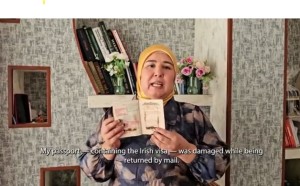On May 22, Sharifa Madrakhimova – a journalist and human rights activist from Uzbekistan’s Fergana region – was supposed to be in Dublin to accept a 2025 Award for Human Rights Defenders at Risk from Front Line Defenders.
Front Line Defenders, a Dublin-based human rights organization, selected Madrakhimova to received one of this year’s awards, which “honor the work of [human rights defenders] who are courageously making outstanding contributions to the promotion and protection of the human rights of others, often at great personal risk to themselves.”
But Madrakhimova, who has been subject to harassment while monitoring cotton harvests in Uzbekistan, didn’t make it to Dublin.
Front Line Defenders reported last week that Madrakhimova had been prevented from traveling to Ireland via the apparently deliberate damaging of her passport and delays in obtaining a replacement.
Madrakhimova’s passport, with a valid Irish visa stamp, was delivered on May 7 by DHL to her home in Kokand, Uzbekistan. However, Front Line Defenders said in a statement that:
…the back cover of the passport, where the biometric chip is located, as well as several other pages were visibly burned. Front Line Defenders believes that her passport was burned on purpose. The destruction most likely took place when the parcel was passed over to a local courier service within Uzbekistan, right before the delivery.
The envelope had been mailed from Dublin, presumably with the passport undamaged. Front Line Defenders said that they believe the passport was removed from the envelope during the last part of its journey in Uzbekistan.
Madrakhimova, Front Line Defenders said, immediately applied for a new passport. Local authorities said it would take 10 days and that she would have to wait for it to be delivered in Kokand on May 23 – the day after the scheduled award ceremony. On May 23, “the special courier service arrived with several travel documents, yet without Sharifa Madrakhimova’s.”
Madrakhimova reportedly received a new passport on May 26, hours after Front Line Defenders issued its statement. According to reporting by the Irish Times, “Hours after [Front Line Defenders] publicized the incident online, Ms Madrakhimova received her new passport in the post, albeit without her visa for the Schengen area.”
In their statement, Front Line Defenders urged the Uzbek authorities “to halt its intimidation tactics against Sharifa Madrakhimova and ensure that she is not restricted from travelling outside of Uzbekistan.”
In a subsequent statement, the Cotton Campaign – with which Madrakhimova has collaborated in monitoring Uzbekistan’s cotton harvests – urged the Uzbek government to “conduct a prompt, independent, and transparent investigation of the destruction of Sharifa Madrakhimova’s passport.”
“Human rights activism and independent civil society monitoring of the annual cotton harvest – including by Madrakhimova – have played a critical role in driving an end to systemic state-imposed forced labor in the cotton sector,” Bennett Freeman, Cotton Campaign co-founder and former U.S. deputy assistant secretary of state for democracy, human rights, and labor said in the statement. “Preventing human rights defenders and monitors from leaving the country or exerting intimidation and pressure in other ways puts this progress at risk. The Uzbek government should ensure accountability for these acts and take concrete steps to prevent any further rights violations.”
On May 22, Madrakhimova joined the award ceremony by video, explaining why she wasn’t in attendance and displaying her burned passport.
“In a way, this too is a form of recognition of the impact of my work,” she said in a pre-recorded message.
Umida Niyazova, the executive director of the Uzbek Forum for Human Rights, delivered a speech in Dublin on Madrakhimova’s behalf.
The two women were together in April 2024 when they were ambushed by two men in Kokand. They had been planning to tour Fergana region to speak to farmers and companies engaged in the cotton industry. The men accused them of “organizing information attacks against Uzbekistan.” The incident was followed by an online harassment campaign targeting the women and their work.
“Preventing Madrakhimova’s travel is the latest in a series of incidents targeting independent monitors, activists, workers, and other independent voices from speaking out on rights violations or seeking to organize,” the Cotton Campaign said in a statement.
In 2022, after a dozen years, the Cotton Campaign announced the end of its Uzbek cotton pledge, signed by 331 brands and retailers, to boycott Uzbek cotton on account of forced labor. That marked a high-point in Uzbekistan’s post-Karimov era. But although the wide-ranging reform program launched by President Shavkat Mirziyoyev after coming into office in 2016 has made some progress, that progress is neither universal nor irreversible, as Madrakhimova’s case illustrates.

































